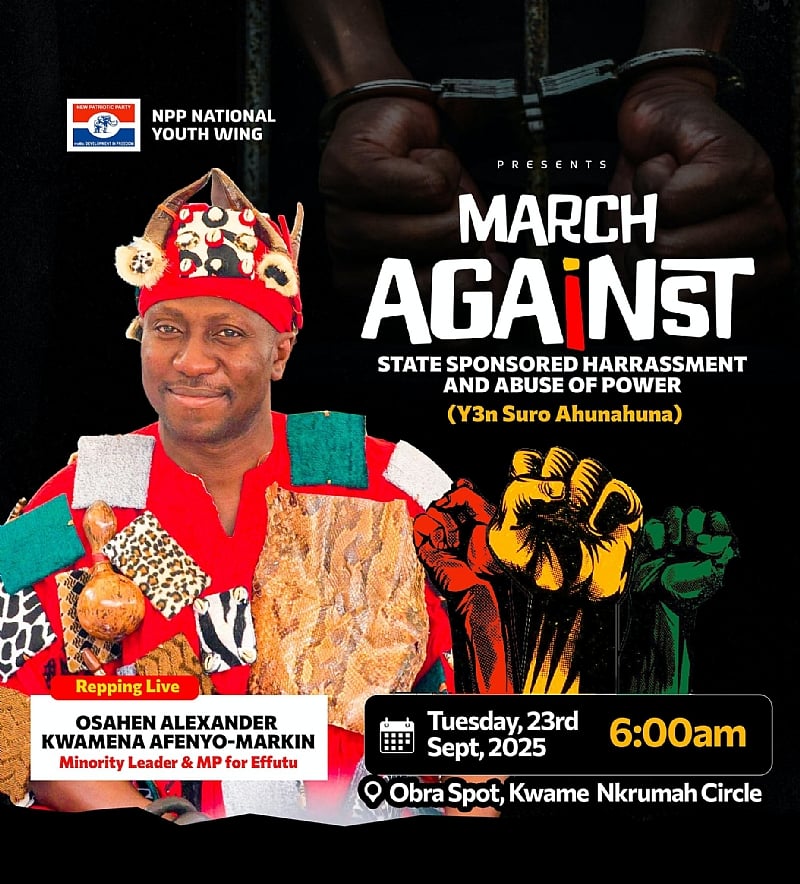The New Patriotic Party (NPP) is gearing up for a major demonstration dubbed “Yɛn Suro Ahunahuna,” meaning “We do not fear oppression,” scheduled for Tuesday, September 23rd, in Accra, Ghana. This protest, spearheaded by the party’s Youth Wing, is a direct response to what the NPP perceives as a pattern of selective justice, state-sponsored violence, and political intimidation targeted at its members. Salam Mustapha, the National Youth Organiser, has framed the demonstration as a critical juncture for the party, a moment to publicly declare its unwavering resolve against these perceived injustices and to demand accountability from the ruling government. The planned march, beginning at Obra Spot and culminating in petitions delivered to both the Police Headquarters and the Jubilee House (the presidential office), signifies the seriousness of the NPP’s concerns and their determination to make their voices heard.
The NPP’s grievances stem from what they characterize as a deliberate and escalating campaign of harassment and violence against their members. Mustapha has condemned these alleged actions as “shameful and reprehensible,” emphasizing that the party will not stand idly by while its members are subjected to such treatment. The “Yɛn Suro Ahunahuna” demonstration is thus not merely a protest against specific incidents, but rather a broader statement against the perceived erosion of democratic principles and the chilling effect of political intimidation on free expression and dissent. The party is calling for an end to this perceived targeting and demanding that the authorities uphold the rule of law and ensure equal protection for all citizens, regardless of political affiliation.
The demonstration is anticipated to be a significant show of force for the NPP, with projections of massive participation from party members across the country. Mustapha has confirmed that the protest will not be limited to the youth wing but will involve the entire party structure, including senior leadership, the Minority Leader in Parliament, and the entire Minority Caucus. This unified front underscores the party’s commitment to addressing what they see as a systemic problem requiring a collective response. The presence of prominent party figures signifies the importance they place on this demonstration as a platform to express their concerns and to rally support for their cause.
The “Yɛn Suro Ahunahuna” demonstration represents a culmination of growing frustration and anxiety within the NPP regarding the political climate in Ghana. They argue that the current administration is using its power to suppress dissenting voices and create an atmosphere of fear and intimidation. The demonstration is their attempt to push back against this perceived trend and to reaffirm their commitment to democratic principles and the right to freely express their views without fear of reprisal. The party sees this protest as a crucial step in safeguarding the democratic space and ensuring a level playing field for all political actors.
The NPP’s choice of the slogan “Yɛn Suro Ahunahuna” – “We do not fear oppression” – is a deliberate and powerful statement of defiance. It reflects their determination to stand up against what they perceive as unjust actions by the government and to assert their right to participate fully in the political process without fear of intimidation or violence. The slogan serves as a rallying cry for party members and a message to the ruling government that they will not be silenced or cowed into submission. It encapsulates the spirit of the demonstration and the NPP’s broader commitment to fighting for what they believe in, even in the face of adversity.
The upcoming demonstration promises to be a significant event in Ghana’s political landscape. It represents a direct challenge to the ruling government and a test of the country’s commitment to democratic principles. The outcome of the protest and the government’s response will likely have far-reaching implications for the political climate in Ghana, potentially shaping the trajectory of political discourse and the relationship between the ruling party and the opposition. The “Yɛn Suro Ahunahuna” demonstration is not just a protest; it is a declaration of the NPP’s resolve to resist what they see as oppression and to fight for a more just and equitable political environment.














